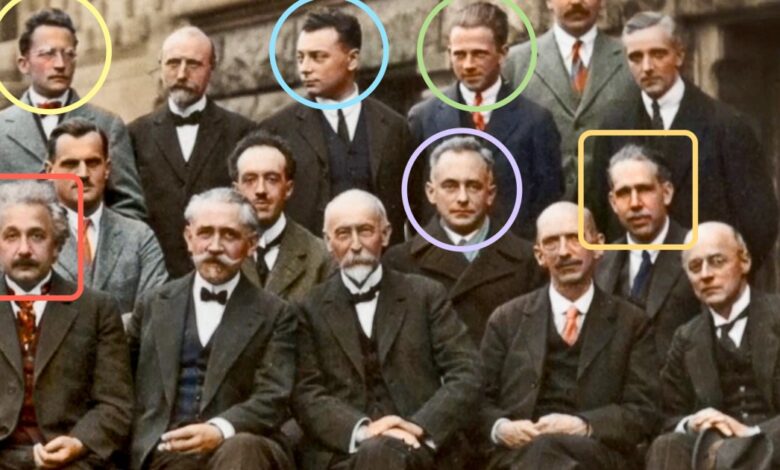How “group genius” surpassed Einstein

Quantum mechanics — the creation of several surpassing geniuses in a period of just three years — is the finest example of “collective” or “group genius” in the history of science. The expression “group genius,” inseparable from the then-prevailing zeitgeist, refers to genius traits and legacies far transcending the sum of its parts. Its underlying principles, promulgated in the Copenhagen interpretation under the group’s “father confessor” Niels Bohr, are counterintuitive and indeterministic in distinction to classical mechanics (including relativity), where they are intuitive and deterministic. Just like great art, quantum mechanics is open-ended and porous. The most successful scientific theory in history may forever remain as tantalizing and enigmatic as Mona Lisa’s smile, resonating with a message from nature: “It was my destiny to know more than you!”
The celebrated fifth Solvay Conference (1927) had been organized to debate the credibility of quantum mechanics based on the matrix mechanics and uncertainty principle of Heisenberg, the wave mechanics of Schrödinger, along with the probabilistic interpretation of wave functions set down originally by Max Born. Like two tennis champions facing each other across the net, Einstein served gedankenexperiment after gedankenexperiment with blinding speed and perfect placement. Bohr returned the serves with top-spin, slices, and scattershot effects. And he won all the points. The Bohr-Einstein debates were continued at the sixth Solvay Conference in 1930 and they would have continued at the seventh conference in 1933 had Einstein chosen to attend. The controversy has had monumental significance for the philosophy underlying quantum mechanics and the fundamental nature of reality. To his dying day Einstein was never able to reconcile himself with the uncertainty principle. In a memorable exchange, one that was repeated again and again with minor variation, Einstein decried the uncertainty principle: “God does not play dice with the universe!” Bohr offered the riposte: “Einstein, stop telling God what he can and cannot do!”
In 1935, Einstein, in collaboration with Boris Podolsky and Nathan Rosen, wrote a paper claiming quantum mechanics was incomplete, that there existed “hidden variables” (the actual expression was introduced much later), and for that reason quantum mechanics was forced to be probabilistic and not exact.
“Bohr was inconsistent, unclear, willfully obscure, and right. Einstein was consistent, clear, down-to-earth, and wrong.”
John Stewart Bell
The puzzling assessment in the quotation above was offered by John Stewart Bell (1928–1990). Bell, lacking the academic pedigree of many of the creators of quantum mechanics, was an unlikely candidate to delve deeper into the firmament of the theory than anyone else. Yet this veritable quantum mechanics hobbyist, hailing from Northern Ireland, formulated a remarkable theorem testing the theory’s veracity. Bell’s theorem (1964) states:
If [a hidden-variable theory] is local it will not agree with quantum mechanics, and if it agrees with quantum mechanics it will not be local.
With experiments suggested by Bell, his theorem and its subsequent variations have been put to repeated experimental tests since 1972, most prominently by the French physicist Alain Aspect in the 1980s. Bell himself confessed to having been initially in Einstein’s corner in examining the Bohr-Einstein debates, but came to change his mind. At the submicroscopic scale we cannot examine nature without disturbing it, without insinuating ourselves into the process. Orthodoxy in physics fully accepts this concept. Late in the 20th century, the legendary Rudolf Peierls of Oxford described the Copenhagen interpretation as “battle tested.” But it is also the nature of human warfare that the defeated side is bound to resurrect the challenge.




